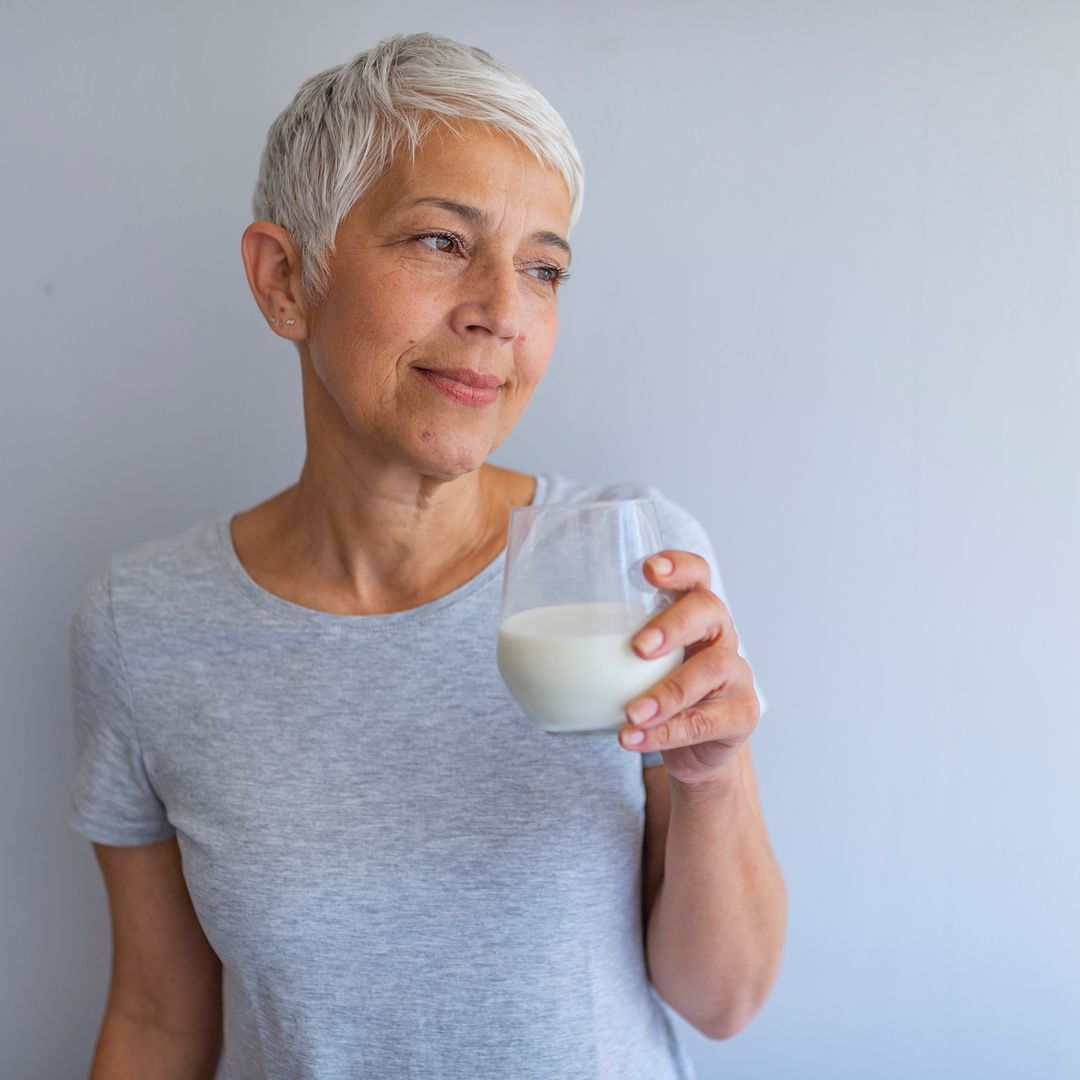The Complete Menopause Diet Guide

Menopause is the natural transition of the time menstrual cycles end. It is confirmed once 12 months have passed since your last period. However, the transition and symptoms connected with menopause can have a detrimental effect on daily life and can last for several years.
Summary
- Researchers have found there is a link between food and symptoms experienced during menopause. A number of health conditions can also become more at risk during menopause so it is essential to keep menopause nutrition in check.
- Foods to eat during menopause include foods naturally containing phytoestrogens, like grapes, peanuts and chickpeas. It is also worth adding whole grains, dairy products, vegetables, fruits, healthy fats and high-quality proteins.
- There are some foods that can trigger and make menopause symptoms worse. For example, foods that are high in salt, sugar, spicy foods, processed carbs and high fat can make hot flashes more intense and frequent.
- Our bodies are all different so use your best judgement when it comes to nutrition for menopause. Some foods may trigger some people and not others but paying attention to your diet the transition through menopause can be managed.
- Managing menopause nutrition can also help with weight-related changes, including how to get rid of menopause belly.
Introduction
Menopause is the natural transition of the time menstrual cycles end. It is confirmed once 12 months have passed since your last period. However, the transition and symptoms connected with menopause can have a detrimental effect on daily life and can last for several years.
During the menopause transition and beyond, estrogen levels begin to decline – disrupting your standard cyclical patterns of estrogen and progesterone. This can lead to symptoms like hot flashes, sleep difficulty and bone health. The National Institute on Aging has reported that during menopause, the way our bodies use energy also changes, which can lead to weight gain.
Although menopause is connected to a range of uncomfortable symptoms and can increase the risk of certain health conditions, there are a number of ways to reduce symptoms and ease the transition. Fortunately, a few changes can be made to your diet to help relieve symptoms. This article provides a guide to foods to eat during menopause.
Good Food for Menopause

Menopause is a time of change, and many aim to manage symptoms via their diet. However, one area which causes concern is the drop in oestrogen levels, causing inflammation and weight gain. This is something which can have a significant impact on confidence, and it may not be down to simply overeating. Korean researchers at Incheon National University concluded that estrogen deficiency during menopause could result in an increase in body weight and fat.

There are some oestrogen foods which could help our bodies get a boost of the much-needed hormone. The compounds found in these superfoods are called phytoestrogens, and they can act as weak estrogens in the body. Although research is ongoing, studies like that conducted at Hsin Sheng Junior College of Medical Care and Management (Taoyuan) have shown phytoestrogens appear to help reduce the number of hot flashes experienced during menopause. Additional research in 2020 found phytoestrogens could also help reduce depression among postmenopausal women. So well worth including in a menopause diet plan.
Foods that naturally contain phytoestrogens include the following:
- Grapes
- Berries
- Plums
- Soybeans
- Chickpeas
- Peanuts
- Green and black tea
In addition to phytoestrogens, other food groups should be considered as a positive addition to your menopause diet. For example, the following foods have the potential to help relieve some symptoms of menopause, such as poor sleep and low bone density.
- Whole Grains – It is no secret that whole grains are good for the body. They are highly nutritious, fibrous and contain vitamins, such as thiamine, niacin, riboflavin and pantothenic acid. In addition, a 2021 review found whole grains help with weight management. These delicious whole-grain foods include barley, quinoa, brown rice, whole-wheat bread, rye, and Khorasan wheat.
- Dairy Products – Bones are at higher risk of fractures during menopause due to the decline in estrogen levels. A team of Greek researchers also found a connection between the age at menopause and fracture risk, meaning we should be looking after bone health in our younger years too. Dairy products, such as milk, cheese and yoghurt, contain calcium, magnesium, potassium, phosphorus and vitamins D and K –all essential to bone health. A recent Japanese study also found milk and dairy products could helo with sleep, which many people who are going through menopause struggle with.
- Vegetables and Fruits – Unsurprisingly, fruits and vegetables also play an essential part in a healthy diet for menopause. They are packed with vitamins, minerals, fibre and antioxidants. Cruciferous vegetables and dark barriers may be especially helpful for menopausal people as they can help reduce hot flashes, promote a healthier diet and aid weight loss.
- Healthy Fats – When it comes to healthy fats and their place in eating for menopause, a lot more research is needed as some results are inconclusive. However, it is known that healthy fats, such as omega-3 fatty acids found in some fish and seeds, could decrease the frequency of hot flashes and the effects of night sweats.
- Quality Protein – When estrogen levels drop during menopause, muscle mass and bone strength often decrease. For this reason, it is recommended that people going through menopause should consume more protein. Foods to be included in a high protein diet include eggs, fish, meat, legumes and dairy products. Protein powder can also be added as part of your menopause diet plan.
What Foods Make Menopause Worse

In addition to adding foods that are good for menopause nutrition, some should be avoided to help reduce symptoms like hot flashes, poor sleep and weight gain. A UK women’s cohort study published in 2018 found that diety intake could be directly linked to the natural age you may start natural menopause. It was reported that those who had a higher intake of refined carbs, such as pasta and rice, were associated with earlier menopause compared to those who ate oily fish and fresh legumes.
With the fact that research is showing a close relationship between the food we eat with the age menopause could start, along with the associated symptoms, there is a strong argument that nutrition for menopause is something we should consider at all stages of life. So here are some of the foods to avoid during menopause or try to restrict as a once-in-a-while treat:
- Caffeine and Alcohol – At the start of the day, many enjoy a hot cup of coffee to help wake us up. Unfortunately, this caffeinated drink can trigger hot flashes and the severity. Alcohol can also have a similar effect, along with disrupting sleep. With this in mind, it may be worth testing whether eliminating caffeine and alcohol helps relieve these two common menopausal symptoms
- Processed Carbs and Added Sugar – We are all aware that processed foods and added sugars are not good for us. However, when going through menopause, these unhealthy foods can also lead to high blood sugar, which in turn increases the number of hot flashes. You could help reduce the incidences of hot flashes by limiting your intake of processed foods, such as white bread, cakes and breakfast cereals.
- High Salt Foods – One area to be carefully monitored during the menopause transition (MT) is the increased risk of low bone mineral density. A 2018 collaboration between three researchers for the Obstetrics and Gynaecology Clinics of North America stated that MT is a time-limited window of opportunity to prevent rapid bone loss and stave off osteoporosis in later years. Salt intake has been linked to lower bone density in postmenopausal people. Having a moderate-sodium diet may also help improve your overall mood.
- Spicy Foods – The argument on whether it is better to avoid spicy foods during menopause is mixed. Research in India, Spain and South America found a connection between hot flashes, anxiety levels and spicy foods. However, your reaction to spicy foods will be individual so use your best judgement when it comes to including spicy foods in your menopause diet
- High-fat Foods – As tasty as fatty foods may be, it is not great for our waistlines and hearts. Saturated fat and trans fats can raise cholesterol and increase heart disease risk. So limit your intake of fatty meats, cheese, whole milk and ice cream. It is also worth watching out for the trans fats found in vegetable oils, margarine, and some baked goods.
Closing Thoughts
With simple changes to your diet, the transition through menopause can be much more manageable. Making sure you get the proper nutrition for menopause will mean eating whole foods – including vegetables, fruits, whole grains, dairy products and high-quality protein. This will ensure your diet will consist of foods which will help cope with unpleasant menopause symptoms.
If menopause becomes particularly tough, it may be worth reviewing your diet to ensure you are focusing on nutrition for menopause. You will likely want to limit processed carbs, alcohol, added sugars, caffeine, spicy foods and foods with high sodium content. They can result in symptoms improving and help with healthy ageing.
Frequently Asked Questions (FAQs)
What is the best diet for a menopausal woman?
A person going through menopause should be focusing on eating healthy foods. Try to include whole foods high in vegetables, fruits, dairy products, whole grains and high-quality protein. Including natural phytoestrogens and healthy fats, like omega-3 fatty acids from fish, can also help reduce menopause symptoms.
How can I lose weight during menopause?
Losing weight during menopause involves making healthy lifestyle choices. For example, get plenty of exercise and make sure you do not become sedentary, even during the days when your symptoms may be flaring up. In addition, practice mindful eating as it can be more challenging to lose weight due to the oestrogen levels dropping and your metabolism slowing down.
What foods should you avoid during menopause?
Research has shown that some foods may aggravate menopausal symptoms. For example, processed foods are often high in sodium and added sugar which causes you to retain water and become uncomfortably bloated. It is also a good idea to limit your alcohol consumption as it makes some people going through menopause transition more susceptible to hot flashes.
Does keto work for menopause?
There is currently no scientific evidence to confirm that the kept diet benefits menopause. Some people find that a keto diet helps them reach a moderate weight, but the impact of being in ketosis and menopause symptoms is unclear. However, it is known that those following a low-carb diet compared to other diet types are at a lower risk of postmenopausal weight gain.
What foods are high in oestrogen?
People can introduce many healthy high-estrogen foods as part of their menopause diet plan. For example, soybeans and soybean products (such as tempeh, tofu and edamame) contain high quantities of specific phytoestrogens. In addition, there are tasty snacks like cashews, almonds, dried fruit and berries, which are full of phytoestrogens, vitamins, antioxidants and fibre – all great for managing menopausal symptoms.
References
https://www.nia.nih.gov/health/what-menopause
https://www.sciencedirect.com/science/article/pii/S2405580820301035
https://www.ncbi.nlm.nih.gov/pmc/articles/PMC4389700/
https://d197for5662m48.cloudfront.net/documents/publicationstatus/43201/preprint_pdf/dc9b72ffb4b5bfbee4364d75d8fbdc66.pdf
https://www.ncbi.nlm.nih.gov/pmc/articles/PMC8308420/
https://www.erkenmenopoz.com/konu/dosyalar/menopoz_makale_ozetleri/subat2019_6.pdf
https://www.ncbi.nlm.nih.gov/pmc/articles/PMC7766425/
https://jech.bmj.com/content/72/8/733
https://www.ncbi.nlm.nih.gov/pmc/articles/PMC6226267/

.png?alt=media&token=dd07ee48-4d29-4852-90ba-7bd8a0f5bf2c)

